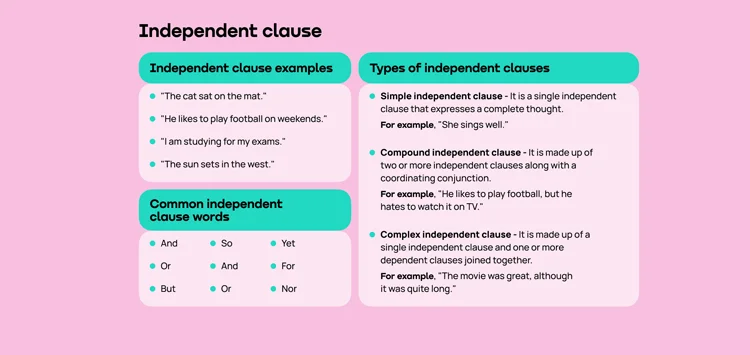Examples Of Dependent Clauses Assignment Help
A dependent clause, often known as a subordinate clause, is a group of words that contains a subject and a verb but cannot stand alone as a complete sentence. Instead, it relies on an independent clause to form a complete thought. Understanding dependent clauses is crucial for constructing clear and coherent sentences.
Dependent clauses typically begin with subordinating conjunctions such as "because," "although," "while," "since," "if," and "when." These conjunctions signal the relationship between the dependent clause and the independent clause in the sentence. For instance, in the sentence "Because it was raining," the dependent clause "Because it was raining" cannot stand alone and needs an independent clause to complete its meaning.
Examples of dependent clauses abound in various contexts. In complex sentences, they provide additional information, such as time, cause, condition, or contrast, that enriches the main idea expressed in the independent clause. For example, "Although she studied hard, she didn't pass the exam," illustrates a dependent clause ("Although she studied hard") modifying an independent clause ("she didn't pass the exam").
In academic assignments, recognizing and properly utilizing dependent clauses can enhance the clarity and sophistication of one's writing. By mastering the usage of dependent clauses, students can construct more complex sentences, convey nuanced ideas, and ultimately elevate the quality of their writing assignments. Therefore, grasping the concept of dependent clauses is fundamental for effective communication in both written and spoken language.
Which dependent clause kinds are most frequently used?
In the realm of academic guidance, understanding the nuances of dependent clauses is paramount for effective writing. Dependent clauses, which lack the ability to stand alone as complete sentences, play a crucial role in sentence structure and coherence. Among the myriad types of dependent clauses, some emerge as frequently used staples in academic writing.
One prevalent type of dependent clause is the "adverbial clause." These clauses modify verbs, adjectives, or adverbs, providing essential information about time, place, manner, or condition. For instance, "After the lecture, the students reviewed their notes" showcases an adverbial clause indicating time. Adverbial clauses contribute to the precision and clarity of academic discourse, guiding readers through temporal and contextual relationships.
Similarly, "relative clauses" are ubiquitous in academic texts. These clauses provide essential details about a noun in the sentence, often introduced by relative pronouns such as "who," "which," or "that." For example, "The study, which was conducted over six months, revealed significant findings." Relative clauses offer specificity and depth, enabling writers to convey complex ideas with precision.
In academic writing, mastering the usage of these frequently employed dependent clause types enhances clarity and coherence. Recognizing their functions empowers writers to craft cohesive arguments and articulate research findings effectively, thereby elevating the quality of scholarly discourse.
What distinguishes independent clauses from dependent ones?
Independent clauses and dependent clauses are fundamental components of sentence structure, each serving distinct roles in conveying meaning. An independent clause functions as a complete sentence on its own, expressing a complete thought and typically containing a subject and a predicate. In contrast, a dependent clause cannot stand alone as a complete sentence because it does not express a complete thought. Instead, it relies on an independent clause to give it meaning and context.
One key aspect that distinguishes independent clauses from dependent ones is their ability to function independently within a sentence. Independent clauses have the freedom to stand alone as sentences, whereas dependent clauses rely on other elements to complete their meaning. For students seeking clarity on this topic, Assignment Help Tutors offer invaluable assistance. These tutors specialize in guiding students through grammar concepts, such as independent and dependent clauses, providing tailored explanations and examples to aid comprehension.
Online writing helper can further enhance understanding by offering interactive exercises and personalized feedback on assignments. Through these resources, students can strengthen their grasp of sentence structure and improve their writing skills. By recognizing the distinctions between independent and dependent clauses, writers can construct clearer and more cohesive sentences, ultimately enhancing the effectiveness of their communication.
Could you give an example of a sentence that uses a dependent clause?
In the realm of Assignment Assistance, understanding dependent clauses is crucial for crafting coherent and structured sentences. A prime example of a sentence utilizing a dependent clause is: "Although she studied diligently, Sarah still struggled to pass the exam." In this sentence, the dependent clause "Although she studied diligently" cannot stand alone as a complete sentence because it lacks a subject-verb combination. Instead, it relies on the independent clause "Sarah still struggled to pass the exam" to form a complete thought. The dependent clause adds additional context by indicating a contrast between Sarah's effort and her outcome.
Recognizing such clauses allows writers to vary their sentence structures, enhancing the richness and complexity of their writing. Moreover, it facilitates the development of more sophisticated arguments and narratives by enabling the introduction of subordinate ideas. Assignment Assistance providers like BookMyEssay emphasize the importance of mastering dependent clauses to enhance students' writing skills. Through targeted guidance and practice, learners can effectively incorporate dependent clauses into their assignments, elevating the overall quality of their work. Thus, understanding and proficiently using dependent clauses are essential components of successful academic writing, enabling students to convey their ideas with clarity and precision while adhering to the conventions of standard English grammar.







 3 Bellbridge Dr, Hoppers Crossing, Melbourne VIC 3029
3 Bellbridge Dr, Hoppers Crossing, Melbourne VIC 3029




